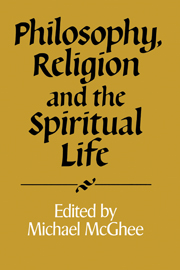Book contents
- Frontmatter
- Contents
- Introduction
- Philosophy and Religion in the Thought of Kierkegaard
- De Consolatione Philosophiae
- The real or the Real? Chardin or Rothko?
- Love and Attention
- Descartes' Debt to Augustine
- Visions of the Self in Late Medieval Christianity: Some Cross-Disciplinary Reflections
- Refined and Crass Supernaturalism
- Religious Imagination
- Moral Values as Religious Absolutes
- Revealing the Scapegoat Mechanism: Christianity after Girard
- Philosophy vs. Mysticism: an Islamic Controversy
- Non-Conceptuality, Critical Reasoning and Religious Experience: Some Tibetan Buddhist Discussions
- ‘Know Thyself’: What Kind of an Injunction?
- Facing Truths: Ethics and the Spiritual Life
- Notes on Contributors
- Index
Non-Conceptuality, Critical Reasoning and Religious Experience: Some Tibetan Buddhist Discussions
Published online by Cambridge University Press: 04 August 2010
- Frontmatter
- Contents
- Introduction
- Philosophy and Religion in the Thought of Kierkegaard
- De Consolatione Philosophiae
- The real or the Real? Chardin or Rothko?
- Love and Attention
- Descartes' Debt to Augustine
- Visions of the Self in Late Medieval Christianity: Some Cross-Disciplinary Reflections
- Refined and Crass Supernaturalism
- Religious Imagination
- Moral Values as Religious Absolutes
- Revealing the Scapegoat Mechanism: Christianity after Girard
- Philosophy vs. Mysticism: an Islamic Controversy
- Non-Conceptuality, Critical Reasoning and Religious Experience: Some Tibetan Buddhist Discussions
- ‘Know Thyself’: What Kind of an Injunction?
- Facing Truths: Ethics and the Spiritual Life
- Notes on Contributors
- Index
Summary
The Dalai Lama is fond of quoting a verse attributed to the Buddha to the effect that as the wise examine carefully gold by burning, cutting and polishing it, so the Buddha's followers should embrace his words after examining them critically and not just out of respect for the Master. A role for critical thought has been accepted by all Buddhists, although during two and a half millennia of sophisticated doctrinal development the exact nature, role and range of critical thought has been extensively debated. In general doctrinal difference in Buddhism has been seen as perfectly acceptable, reflecting different levels of understanding and therefore different stages on the path to enlightenment. Buddhism has tended not to look to or expect doctrinal orthodaxy, although there has always been a much stronger impetus towards orthopraxy, and common (largely monastic) code and behaviour has perhaps played a comparable role in Buddhism to common belief and creed in some other religions. Nevertheless an acceptability of doctrinal divergence has not lessened the energy and vigour devoted to lengthy and sometimes fiercely polemical debate between teachers and schools. This was nowhere more so than in Tibet, where doctrinal debates—sometimes lasting all night—to the present day form the central part of a monastic education in most of the largest Tibetan monastic universities.
- Type
- Chapter
- Information
- Philosophy, Religion and the Spiritual Life , pp. 189 - 210Publisher: Cambridge University PressPrint publication year: 1992
- 1
- Cited by



